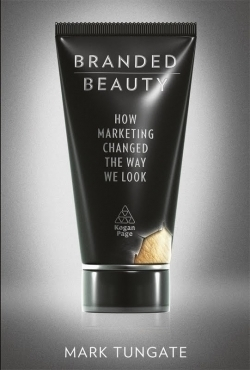Branded Beauty
How Marketing Changed the Way We Look
- 2011 INDIES Finalist
- Finalist, Business & Economics (Adult Nonfiction)
For many women, and quite a few men, a beauty product of some kind ranks as an absolute must-have before leaving the house. A 2010 survey of over 8,000 French women revealed that 25 percent would not consider leaving the house without some form of make-up. Although the desire to enhance one’s looks has its roots in antiquity, the acceptance level of cosmetics has ebbed and flowed throughout history, ranging from being celebrated in royal courts to being disparaged as the devious tools of prostitutes and actresses. In Branded Beauty, Mark Tungate follows the key companies and personalities that brought make-up to the masses, forever changing the way people think about beauty, while also making the multi-billion dollar cosmetic industry one of the most profitable in the world.
The first half of the book describes the rise, usually from very humble beginnings, of industry legends such as Helena Rubinstein, Elizabeth Arden, Estee Lauder, Max Factor, and Charles Revson. Tungate notes that what unites these figures, many of whom were fierce rivals, was their ability to craft a story behind their products that would enchant their customers and draw them into a world of beauty and glamor. They pioneered such marketing strategies as the gift with purchase, in-store sampling, and the idea that customers were not just buying a product, but paying for an experience (which of course justified the hefty price tag). Tungate’s descriptive writing and cliffhanger chapter endings make the biographical portion of the book both fascinating and highly entertaining.
The latter chapters deal with more modern beauty trends and companies and feature separate sections on the rise of natural and organic products, global beauty trends and companies, plastic surgery, and the increasing popularity of tattoos. Tungate’s arguments are well-researched and his findings on an industry that is notoriously secretive are enlightening and often surprising.
Tungate often notes the irony of an industry that produced some of the first female business leaders while simultaneously promoting the idea that a woman’s natural form, particularly as she ages, is in drastic need of alteration. But he does not spend significant time analyzing the industry’s affect on self-image, and Branded Beauty should not be seen as a critique of cosmetic companies. Rather, it is an in-depth look at how the industry developed and where it stands today. After all, Tungate’s speciality is marketing, as an instructor of branding and advertising courses at Parsons Paris School of Art and Design, as well as the author of several books and columns regarding advertising. The story of how a few men and women revolutionized marketing strategies as well as public opinion on beauty is indeed enthralling and Branded Beauty will be valuable for anyone interested in a behind-the-scenes look at one of the world’s most ubiquitous industries.
Reviewed by
Claire Posner
Disclosure: This article is not an endorsement, but a review. The publisher of this book provided free copies of the book and paid a small fee to have their book reviewed by a professional reviewer. Foreword Reviews and Clarion Reviews make no guarantee that the publisher will receive a positive review. Foreword Magazine, Inc. is disclosing this in accordance with the Federal Trade Commission’s 16 CFR, Part 255.

